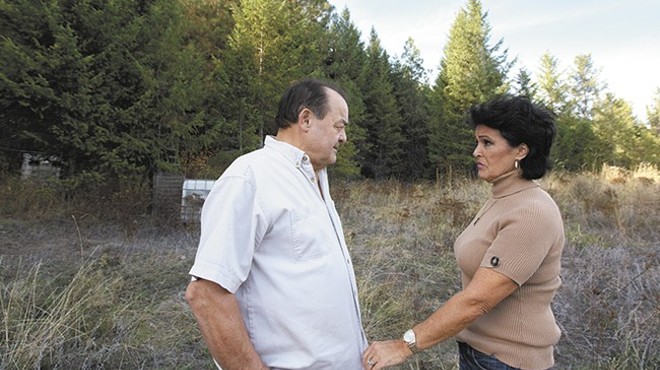
Seventy-year-old Larry Harvey can't tell the truth. At least not the whole truth. Not the part about his gout, his wife's degenerative disc disease and carpal tunnel, her daughter-in-law's uncontrolled weight loss and the neck and back injuries of her son and a family friend. No, the retired truck driver who shares a double-wide with his wife in the woods north of Colville can't say why he started growing medical marijuana. He can't even say the words "medical marijuana."
It just won't be allowed at the federal trial in Spokane set for December that could put Harvey and his family, the so-called "Kettle Falls Five," behind bars for a long time.
Indeed, the War on Drugs rages on: While Washington state may have legalized medical marijuana in 1998 and licensed recreational pot stores earlier this year, in the eyes of federal prosecutors there's still no such thing as legal pot and certainly nothing so benign sounding as "medical marijuana."
In deciding that the Harveys couldn't talk at trial about the medical benefits of pot or their compliance with state law, a federal judge said that "could tempt the jury to disregard federal law."
"One question I have: Where are we?" Assistant U.S. Attorney Earl Hicks asked in a hearing on the case in April. "I think we're in federal court. And that's very important because federal law says you can't have these grows. ... You can be prosecuted for two marijuana plants, if you're growing them, in federal court. We don't do it, but you could be. And that's the law."
Until recently — when the state's first recreational growers were licensed — people cultivating marijuana in Washington generally did so under the flag of medicine, and it is those people, like the Harveys, who have fallen into the feds' crosshairs. And should any of them be found in possession of a firearm, as was the case with the Harveys, the federal government will spare almost no effort in laying down the law.
Some attorneys argue that defendants should be allowed to testify about their medical use of marijuana; the judge could then instruct the jury to ignore it in their decision. Otherwise, "you're forcing the defendant to lie," says Seattle defense attorney Doug Hiatt. "When you cannot tell the truth, you cannot get justice.
"There's a meme out there [that marijuana is legal in Washington]," Hiatt adds, "and the meme is full of shit."
On a hot August morning as Harvey's wife, Rhonda, put on her eyeliner to go float the Kettle River with friends, Stevens County Sheriff's deputies fanned out around the house and pounded on the sliding glass door. Over the course of a few hours, they took 29 of the family's 74 bushy indica plants, bringing the count down to the state-allowed 45 per medical collective. Rhonda, who is 56, remembers asking them when they left, "What's going to happen now?" and an officer telling her, "With the way the laws are changing, we're not really sure."
A week later, they were back — the same officers, she says, now in Drug Enforcement Agency gear — and it was a different story. They pulled the remaining plants from the ground and took, among other things, the Harveys' three guns, computer, two motorcycles and $700 out of Rhonda's panty drawer.
Then nothing for six months. It was February 2013 when, while Rhonda visited family in Alaska, a U.S. Marshal rolled up the driveway and gave Larry Harvey five minutes to "shut the coffee pot off and feed the dogs" before taking him to the Spokane County jail. Warrants were out for Rhonda and the other three.
Since then, the trial has been repeatedly postponed. Federal Judge Fred Van Sickle said the last time he granted a new trial date that this one, scheduled to begin Dec. 1, would come "hell or high water." All five defendants face charges for growing and distributing 100 or more plants, triggering five-year, mandatory-minimum prison sentences if they're found guilty. (While court documents reference 74 plants, those familiar with the case say prosecutors plan to argue that photos found on the family's computer show they once had more.) They're also charged with possessing the guns, which prosecutors contend they were using "in furtherance of" the drug crime. That brings their minimum sentence, if convicted, to at least 10 years.
"I really think, a guy like me, they throw me in prison and I'm done," says Larry, who describes how his gout worsened during his short stint in jail after his arrest. The new medicine he's been given for it, he says, has caused diabetes. Together, the two conditions require a strict diet and close medical watch. "If they put me in prison, it's a life sentence for me."
In the ongoing national discussion of how we should think about marijuana, cases like this have, for some, become evidence of the way the federal government ignores the will of the citizens while costing them money. At a cost of about $29,000 per federal prison inmate per year, the price of putting the Kettle Falls Five away for 10 years could total $1.45 million.
"It's fundamentally unfair what the government is doing," says Greg Scott, a Yakima defense attorney who has worked on marijuana cases in federal court. "This really should be left alone. It's a state issue; let the states deal with it. Don't be coming in just because you don't like the law to find a way to punish people."
The rhetoric, the outrage — none of this is new for Michael Ormsby, the President Obama-appointed U.S. attorney for Eastern Washington. He's been hearing about the controversy around cannabis prosecutions since he took this office in 2010. Both he and his predecessor, Jim McDevitt, say defense attorneys are blowing the issue out of proportion.
"People talk about, 'Oh, our prisons are so full of people and their only sin has been possession of minor amounts or personal use of dope,' and that's just not the case," McDevitt says. "Quite frankly, we had much bigger fish to fry. ... The idea that the U.S. Attorney is going to focus on marijuana cases to the exclusion of others is absolutely ridiculous."
Instead of why people are growing marijuana or even that they're growing it at all, other factors make cases worth federal attention, they say: the involvement of guns, making pot available to kids, growing on federal or public land. Cases are often referred from local law enforcement to the DEA, which investigates and hands its evidence over to the U.S. Attorney's Office. Ormsby and McDevitt say the small percentage of marijuana cases the office ends up actually pursuing involve one or more of those priorities.
"If one of those factors isn't implicated, then we're not going to look at that case," Ormsby says. "It's that simple."
It's hard to determine how many cases like the Harveys are out there. Ormsby says his office doesn't share data on prosecutions, so he won't say how many marijuana-related cases he handles each year.
Nationally, despite the liberalization of state laws and public opinion on the issue, the portion of all drug arrests that are for marijuana — about half — has actually grown slightly over the past 20 years, according to FBI data. Most pot cases are handled in local or state court. In federal court, where the Harveys are to be tried, just 6 percent of people sentenced are there for marijuana, according to the U.S. Sentencing Commission.
In Washington state, attorneys say anecdotally that Ormsby is less marijuana-friendly than his westside counterpart. Prosecutions in Western Washington, like a current case targeting hash-oil makers who caused explosions, they argue, seem more deserving than those Ormsby pursues. But according to the Sentencing Commission, federal pot cases actually make up a larger portion of all cases handled in the Western District than here on the eastside, where meth is a much bigger factor.
The legal reasoning these cases can still happen is simple: The drug remains illegal under federal law. Once the case is in the hands of federal authorities, state law is eclipsed by marijuana's classification in the Controlled Substances Act: Schedule I, "drugs with no currently accepted medical use." That's the same classification as heroin and considered more dangerous than cocaine and meth.
Enforcement of that law, though, remains up to individual U.S. attorneys. Colorado Assistant U.S. Attorney M.J. Menendez said in court last year that she considered the compliance with state law when deciding whether to prosecute pot cases.
"It's been years since we've seen anyone prosecuted at the federal level who is in fact following state law in Colorado," says Brian Vicente, an attorney and executive director of the marijuana advocacy group Sensible Colorado, which campaigned for the state's medical and recreational cannabis laws.
And that's where things get complicated. Washington's medical marijuana law doesn't include some of the regulations that states like Colorado have, leaving it with "no state regulatory program to be in clear compliance with," says Robert Capecchi, a marijuana lobbyist for the national Marijuana Policy Project.
The feds have also spelled out certain types of cases where they're likely to get involved, implying they'll stay out of other ones. Like Ormsby's, the priorities for the federal government include keeping marijuana away from kids, keeping it inside the states where it's legal and preventing the use of weapons in the growing and selling process. (These also apply to Washington's recreational market. For example, state law doesn't ban guns in licensed pot stores, but the Liquor Control Board warns its licensees that having firearms at their businesses could make them vulnerable to federal action.)
Any guidance from Washington, D.C., includes a disclaimer reminding those in the marijuana business that pot is still federally illegal and prosecution is always possible.
In other words: You're safe. Probably.
The focus on guns is particularly troublesome in rural areas, like Eastern Washington, where firearms are common for hunting or protection, defense attorneys argue. The Harveys say they grow and can much of their own food, and hunting is an important part of their way of life. They also worry about protecting their two dogs from bears and other wildlife, they say. According to them, the guns had nothing to do with the marijuana grow, but instead with the realities of living on a mountain.
The Harveys add that whether it's about the guns or the pot, they didn't know they were doing anything wrong. They didn't choose to risk federal enforcement because they didn't know they were.

For lawyers and activists, this is exactly the type of case that shows how the U.S. government is targeting the wrong people.
"Just because you're a medical marijuana patient or grower, your constitutional right to have a gun goes out the window," says Hiatt, the Seattle attorney, who has worked on cannabis cases in Washington since the mid-'90s and was contacted by the Harveys for advice. "They're not thinking about justice or whether anybody is hurting anybody. These people in the middle of nowhere growing a little bit of marijuana aren't hurting anybody. It's totally anti-democratic and completely against the wishes of the people in this state."
To the government, not knowing is not a sufficient defense and guns are non-negotiable.
Under federal mandatory-minimum sentencing rules, started in the 1980s, anyone who has a firearm "in furtherance of" a drug crime faces a five-year sentence for the first gun, more if it's an assault weapon or a machine gun. More firearms can either be lumped into that five-year sentence or can tack on 25 more years for each gun, depending on how the prosecution pursues the charges. Last year, U.S. Attorney General Eric Holder said his department would no longer impose "draconian mandatory-minimum sentences" on low-level nonviolent offenders, including those convicted of drug crimes. But the involvement of guns in cases like the Harveys' could classify them as "violent."
Ormsby calls the presence of firearms in pot cases a "bright red line" for his office because the combination of drugs and guns poses a threat to public safety.
"The burden shifts dramatically if you have a gun anywhere near the production or sales of marijuana," Ormsby says. "You may have a small amount of marijuana that wouldn't otherwise be prosecuted, but if you've got a gun, we're going to look at the case very, very seriously."
Several other recent cases in the state demonstrate Ormsby's willingness to go after growers, especially if they're gun owners.
> On a June night last year, police in Union Gap, a town of 6,000 that hugs the freeway outside Yakima, responded to a domestic violence call. According to his lawyer, Curtis Roberts and his girlfriend had gotten in a fight after getting home from dinner, "she was whoopin' up on him" and he called 911. When officers arrived, Roberts, who lost his right arm after a snowmobiling accident and treated phantom pains with marijuana, willingly led them to his grow. He also showed them some processed marijuana in a backpack and three guns: two rifles and a pistol, for which he had a concealed pistol license.
"They say, 'What's [the pistol] for?' and he says, 'Are you kidding me? Look at me. It's for protection,'" says Roberts' attorney, Greg Scott.
Two months after the first officers saw the grow, DEA agents raided, took the marijuana, grow equipment and guns and arrested him. Because of mandatory minimums for drug crimes that involve weapons, Scott says his client could have faced 55 years in prison if convicted on all counts.
"So we really have no choice here but to work out some kind of a deal," Scott says. "A 'plea negotiation' with the government is a misnomer. There's very little give-and-take."
Five days before Christmas 2013, Roberts signed a plea deal, agreeing to admit he was an illegal drug user in possession of a firearm (a charge with no mandatory minimum). On June 30, eight days before the state's first legal recreational marijuana stores opened, Roberts was sentenced to two and a half years in prison and three years of supervised release.
"That just seems wrong to me," Scott says. "Technically, it's legal, but just because it's legal doesn't necessarily make it right."
Roberts is serving time now in Sheridan, Oregon. He requested that prison to be close to his girlfriend, who, he found after his sentencing, is pregnant.
> Jeffrey Steinborn, a Seattle-based defense attorney who's spent 40 years working on pot cases, calls this "the smallest case I've ever seen in federal court": A 6:30 am DEA raid last spring turned up 14 plants and 16 harvested plants' root balls — just 30 plants total — along with about 20 pounds of drying bud and just under 20 ounces of processed cannabis in Nathan and Suzy Nelson's home and storage shed southeast of Yakima. While the couple had doctors' recommendations for up to 15 plants each, statements from Suzy and texts from Nathan's phone also showed he was likely selling the marijuana to a dispensary in Seattle, something not explicitly allowed under state law.
Nelson agreed to plead guilty and received no jail time, but the relevance of such a small grow came into question as the government and defense argued over his sentencing.
"This is not a close case," wrote Assistant U.S. Attorney Thomas Hanlon, requesting three months in prison and three months home detention. "The Defendant was in no way complying with state law. The Defendant obtained a medical marijuana card as cover for his grow."
"Before the court is what this counsel sees as the 'new breed' of defendants," Steinborn countered. "A large and significant number of Washington residents believe that the conduct here is legal under state law and tolerated under federal enforcement priorities. ... These are citizens who do not set out to break the law, nor would they intentionally or knowingly risk the enormous consequences of a federal drug prosecution."
Like all of the cases in this story, Nelson's crime was a felony, meaning he will face difficult job prospects, can no longer own guns and in some states will not qualify for assistance programs like food stamps.
> Over the winter of 2011-12, Spokane County Sheriff's Office detectives, with the help of the DEA, searched a house in a gated community near Newman Lake. They arrested Jared Kynaston, then 23, and six others living or working there, at what the defense argues was a medical grow, providing for multiple patients whose doctors' recommendations were found at the house. Inside the house, officers had cataloged 562 living plants and 677 pots with just the roots left in them, possibly left over after being harvested (the defense argues that some of those pots actually were empty). In its prosecution, the federal government is counting all of those. That means the seven defendants are facing charges for manufacturing 1,000 or more plants. Because of that count, if they go to trial and are convicted, they'll face 10-year, mandatory-minimum sentences. That could grow for Kynaston and others, since officers found a .40-caliber Glock in the garage.
With a larger grow and cops' accusations that he sold the pot on the black market instead of to patients, Kynaston may be a less sympathetic character than some of the others. But because this would be his third felony drug offense (he has previous convictions for marijuana possession) and because he's charged with growing 1,000 plants or more, he could face a mandatory-minimum life sentence.
"Life for marijuana?" says Kari Boiter, an Americans for Safe Access activist who is working on the Harveys' case and others. "I don't care what you're doing with marijuana, that's crazy."

When a photographer and I arrive at the Harveys' home, Boiter is the first one to greet us. She welcomes us in, introduces everyone and takes a seat on a couch behind me. As I ask the Harveys about their time on the mountain, their lives before all this and what they remember about the three times law enforcement came speeding up their driveway, they're constantly looking over my shoulder for Boiter's silent approval. In lieu of their lawyers, Boiter has been the one arranging media interviews and sitting in on them, from local outlets to CNN and Time magazine.
While part of the reasoning for this is to make sure neither of them say anything that could get them into trouble in court, it's also a window into the careful crafting of narrative that's happening in this fight. While 77 percent of Americans believe marijuana has "legitimate medical uses," according to Pew Research, few people are eager to sympathize with accused drug dealers. So activists make the most of stories like the Harveys' to support their view that medical users are wholly different from violent drug traffickers.
"You don't just go to bat for accused criminals every day," Boiter says. "You do it because they're people like the Harveys that are worth going to bat for."
As Larry Harvey talks about truck driving and commercial fishing, his work before retirement, Boiter interjects. "He's so modest about how hard he's worked," she says. "He didn't just go and be a long-haul trucker or fish in Alaska. He bought his own trucks and was an owner-operator. He bought his own fishing license and own boat and became an owner-operator. I mean, a self-made man in all of this."
The Harveys' story is not flawless. The prosecution will present evidence that they had labeled 1-pound bags and kept sales logs. The Harveys say this was all part of their personal recordkeeping and that they barely knew how to grow decent marijuana plants. Theirs didn't produce enough usable pot to sell even if they had wanted to, they say, and they didn't do anything to hide their activities. Larry had painted a green cross on a plywood sign, thinking that if law enforcement helicopters spotted it, they'd know the grow was medical and move on.
However, with severe medical issues they won't be able to explain to a jury, the Harveys make for a sympathetic case in Boiter's eyes. With a background in the state Legislature and TV news, she's the one who came up with the name "Kettle Falls Five," knowing it would stick. She took Larry to Washington, D.C., earlier this year, taking a red-eye flight from Spokane and pushing him in a wheelchair from one congressperson's office to another, telling his story and asking them to vote for marijuana law reform. Now, she hopes to organize enough supporters of the family to pack the courtroom during the trial and show the jury that the Harveys are not alone.
Advocates believe this may be their moment. Public opinion continues to arc toward support for marijuana legalization as fewer politicians defend the War on Drugs. Three states, the District of Columbia and the U.S. territory of Guam all have either medical or recreational marijuana measures on the ballot in this week's election. Politically, the prospect of legalization, decriminalization or rescheduling often brings together people on far ends of the spectrum: justice-conscious liberals and hands-off libertarians. Parse the results of Initiative 502 in Eastern Washington and you'll see that even traditionally conservative precincts that rejected that year's measure legalizing same-sex marriage favored legalizing marijuana.
"This is what people are paying attention to right now," Boiter says. "It's the latest civil rights struggle of our generation."
While public opinion may be changing, that fact doesn't do much in a courtroom. So activists and attorneys like Doug Hiatt have to take the long view.
"If you don't know the giant injustice happening in America on a goddamn daily basis in courtrooms everywhere, you can't change it," he says. "The reason I talk about a lot of this isn't just for my clients or just for that particular case. It's for the system. I hope for systemic change ... and I don't think we get any change unless the truth gets told."
The Harveys' trial date is approaching quickly, and Larry spends most of his time watching NASCAR and hunting shows to keep his mind off it. With each pretrial back-and-forth in court, the defense seems to lose another piece of the story it hopes to tell the jury. Meanwhile, Rhonda and Larry maintain that they won't take a plea.
"Even in the plea deals they've offered, I'd come out of it a felon and that means I can't vote, I can't leave the country, can't do nothin'," Larry says. "It's just so hard to believe my country is doing this to me. It just don't make sense." ♦
DOING TIME
Under federal mandatory-minimum sentencing rules, marijuana growers' jail time is based on how much pot they're caught with and the number and type of guns involved. Sentences increase for short-barreled rifles, shotguns or semiautomatic assault weapons, then for machine guns or guns with silencers. More firearms can either be lumped into the initial five-year sentence or can tack on 25 more years for each gun, depending on how the prosecution pursues the charges.



































